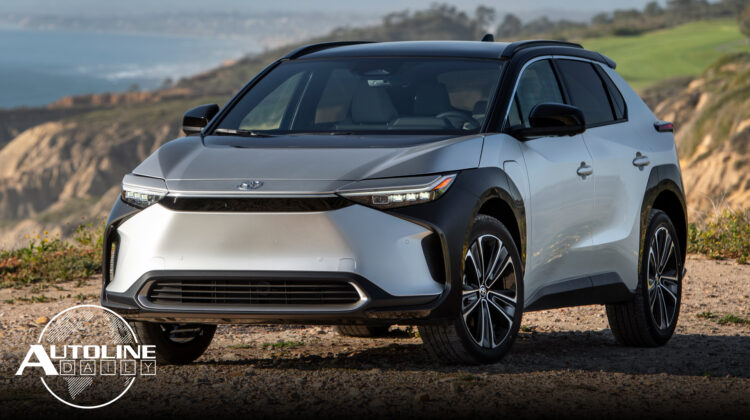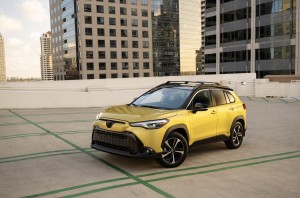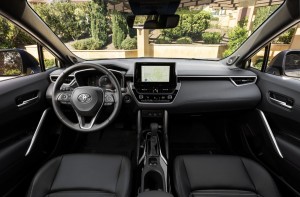
Listen to “AD #3541 – Toyota’s New EV Master Plan; Walmart Opens EV Charging Network; Tesla Cuts Prices Yet Again” on Spreaker.
Follow us on social media:
Runtime:10:03
0:08 Tesla Cuts Prices Yet Again
0:58 Toyota’s New EV Master Plan
3:35 EV Leasing Surges in U.S.
4:47 South Korea Subsidizes U.S. Battery Plants
5:14 Tesla Replaces Mercedes As Most Valuable Car Brand
6:38 Walmart Opens EV Charging Network
7:20 Driving Impressions: Toyota Corolla Cross Hybrid
Visit our sponsors to thank them for their support of Autoline Daily: Bridgestone, Intrepid Control Systems, and Schaeffler.
This is Autoline Daily, the show dedicated to enthusiasts of the global automotive industry.
TESLA CUTS PRICES YET AGAIN
Tesla just cut the prices of its cars, again. This is the fifth price cut since the beginning of the year. Analysts were expecting Tesla to report strong sales in the first quarter thanks to the prior price cuts, but sales only rose 4%. That has us wondering if its sales would have gone down if Tesla did not cut prices. This time around it cut the price of the Model 3 by $1,000, the Model Y by $2,000 and the S and X by five grand. Reuters reports that analysts are concerned that all these price cuts are going to hurt the company’s profit margins, which are the best in the industry. And when Tesla releases its first quarter earnings later this month we’ll know if that’s the case.
TOYOTA’S NEW EV MASTER PLAN
As we reported yesterday, Toyota is going to make a major pivot to EVs under its brand-new CEO, Koji Sato. And now we have a better idea of what that entails. Toyota is going to release 10 new BEVs by 2026, and it expects sales of 1.5 million cars a year by then. These next-gen vehicles will ride on a new architecture, not eTNGA, that will cut the number of build processes in half and will double driving range thanks to using batteries with “far greater efficiency.” Two of its new EVs launch in China next year, an electric pickup and a small EV will go into emerging markets and Toyota will start local production of an all-electric 3-row SUV in the U.S. in 2025. That model will feature batteries from a new $2.5 billion facility it’s building in North Carolina. It’s also taking a unique approach to plug-in hybrids. At a time when PHEVs are getting blasted for polluting more than environmental organizations thought they would and reports of low plug-in rates by owners, Toyota is doubling down on the technology. It says it wants to increase driving range beyond 200 kilometers or 124 miles and reposition PHEVs as “the practical BEV” and develop them “as another BEV option.” This is part of its mobility for all strategy, which still includes hybrid vehicle development and fuel cells, mainly used in commercial applications. And like all automakers, Toyota says it will build more intelligent cars that can upgrade features over time, like safety technology, multimedia and vehicle performance.
EV LEASING SURGES IN U.S.
With stricter rules for EV tax credits going into effect later this month, fewer vehicles will qualify for incentives. But once those restrictions go into place, EV leases are expected to surge. To earn the full $7,500 credit, minerals for EV batteries must come from the U.S. or free trade partners and the batteries must be built in North America. But commercial electric vehicles don’t have any of those requirements to get the full incentive and the U.S. Treasury Department ruled that the commercial credit applies to any EV that is leased. And automakers are taking advantage of that loophole. According to Edmunds, before the rule went into effect, leases accounted for 10% of all dealer transactions involving EVs in December. That increased to 16% in January, rose to 25% in February and jumped to 34% in March. And once the new rules go into effect on April 18th, analysts expect that number to keep on growing.
SOUTH KOREA SUBSIDIZES U.S. BATTERY PLANTS
But here’s a surprising development caused by those stricter Inflation Reduction Act rules. South Korea announced it will subsidize Korean battery makers to build plants in the United States. It will provide over $5 billion in financing over the next five years to offer lower lending rates and insurance premiums as well as provide more loans and tax credits.
TESLA REPLACES MERCEDES AS MOST VALUABLE CAR BRAND
Tesla is now the most valuable automobile brand in the world, according to Brand Finance. It looked at things like revenue, brand strength and importance of brand to purchasing decisions to come up with its list. And with a value of $66.2 billion Tesla ranks number 1. That’s more than 5-times more than it was worth before the pandemic started and two positions higher than it was last year. It beat out Mercedes and Toyota, in that order, to take the top spot. A couple of other interesting takeaways are two Chinese brands made the top 25. BYD ranked #12, up from #19 last year, and Geely came in at #22, up from #25.
WALMART OPENS EV CHARGING NETWORK
More companies are starting to open their own EV charging networks. Tesla obviously has its Supercharger network. Mercedes says it’s going to open its own in major markets. Hyundai is considering one for North America. And now Walmart says it’s going to open its own charging network. It has more than 5,000 Walmart and Sam’s Club stores in the U.S. and plans to set up its own charging stations by the end of the decade. It currently operates a network of 1,300 chargers at select stores in a deal with Electrify America. However, it’s unclear if it’s going to partner with a charging provider for this new network.
DRIVING IMPRESSIONS: TOYOTA COROLLA CROSS HYBRID
Yesterday we provided you with John’s driving impressions of the new Toyota Prius Prime, the plug-in hybrid version. Today, here’s what he thinks about the new hybrid version of the Toyota Corolla Cross.
First, a little background on the car itself. It’s a 4-door, 5-passenger CUV that starts at just over $29,000 for the base S model and walks up to $32,400 for the top line XSE, which is a very affordable price in today’s market. But you can also add up to $3,600 in options including a premium sound system, a two-tone roof, adaptive headlights and a convenience package. All wheel drive is standard, it has 196 horsepower under the hood and it is rated at 42 miles to the gallon, which is excellent for an all-wheel drive vehicle.
It has a very good driver position with great visibility all the way around. The gauges are very large and easy to read and the driver’s seat is quite comfortable. The rear seat offers good head room but not a lot of thigh support. And getting in and out of the rear seat involves a bit of a lift-and-twist movement because the door well area for your feet is rather small. Acceleration is adequate, but as is often the case with continuously variable transmissions, there is a noticeable moaning from the engine as you accelerate. And you can feel a bit of vibration in the steering wheel in mid-to-full throttle acceleration. Toyota claims it will deliver a 0 to 60 time of 8 seconds which is a rate that should satisfy most car enthusiasts. Toyota says that makes this a fun car to drive. We say this is a very competent family hauler with excellent fuel economy that has a bit of pep to it.
But that brings us to the end of today’s show. Thanks for joining us and I hope you have a great weekend.
Thanks to our partner for embedding Autoline Daily on its website: WardsAuto.com
Seamus and Sean McElroy cover the latest news in the automotive industry for Autoline Daily.








